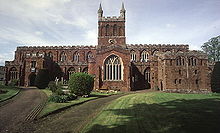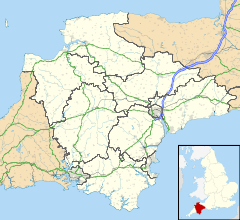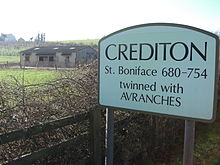- Crediton
-
Coordinates: 50°47′33″N 3°39′05″W / 50.7924°N 3.6514°W
Crediton 
Church of The Holy Cross, Crediton
 Crediton shown within Devon
Crediton shown within DevonPopulation 6,837 (2001) OS grid reference SS837005 Parish Crediton District Mid Devon Shire county Devon Region South West Country England Sovereign state United Kingdom Post town CREDITON Postcode district EX17 Dialling code 01363 Police Devon and Cornwall Fire Devon and Somerset Ambulance South Western EU Parliament South West England UK Parliament Central Devon List of places: UK • England • Devon Crediton is a town and civil parish in the Mid Devon district of Devon in England. It stands on the A377 Exeter to Barnstaple road at the junction with the A3072 road to Tiverton, about 7 miles (11 km) north west of Exeter. It has a population of 6,837.[1] The town is situated in the narrow vale of the River Creedy, between two steep hills and is divided into two parts, the east or old town and the west or new town.
Contents
History
The first indication of settlement at Crediton is the knowledge that Winfrith or Saint Boniface was born here in c. 672.[2] He propagated Christianity in the Frankish Empire during the 8th century and is the patron saint of both Germany and the Netherlands. In 909 a see was established here with Edwulf as the first bishop.[2] Nine more bishops ruled here until 1050, when Leofric obtained papal permission from Pope Leo IX to transfer the seat to Exeter,[2] a more culturally aware, larger and walled town. Since 1897 Crediton has been the seat of a suffragan bishopric in the Diocese of Exeter; since 2004 this has been Robert Evens.[3]
At the Domesday survey (1086) much of the land was still uncultivated, but its prosperity increased, and in 1269 each of the twelve prebends of the collegiate church had a house and farmland within the parish. The bishops, to whom the manor belonged until the Reformation, had difficulty in enforcing their warren and other rights; in 1351 Bishop Grandisson obtained an exemplification of judgments of 1282 declaring that he had pleas of withernam, view of frankpledge, the gallows and assize of bread and ale. Two years later there was a serious riot against the increase of copyhold.
The jury of the borough are mentioned in 1275,[citation needed] and Crediton returned two members to parliament during the reign of Edward I,[4] in 1306-1307, though it was never afterwards represented again. A borough seal dated 1469 is extant, but the corporation is not mentioned in the grant made by Edward VI of the church to twelve principal inhabitants. The borough and manor were granted by Elizabeth I to William Killigrew in 1595, but there is no indication of town organization then or in 1630, and in the 18th century Crediton was governed by commissioners.
The wool trade was established by 1249 and certainly continued until 1630 when the market for kerseys is mentioned in conjunction with a saying as fine as Kirton spinning.[5]
“ … a big lousy town … the houses be mostly of clay, without any timber in the walls except the roof, doors and windows. ” —Richard Symons, a Captain in the Royalist Army, writing about Crediton in 1644.[6]
During the English Civil War the Earl of Essex passed through the town on 20 July 1644 on his way towards Cornwall,[7] and evidently left the town and surrounding countryside in some disarray.[8] He was closely followed by Charles I who arrived in the town on 27 July to review the army gathered there by his nephew, Prince Maurice, before returning to Exeter for a council of war.[9] The following Sunday, the King spent the night at Crediton and then began his expedition of "Essex-catching".[9] In the winter of 1645-46 the town was used as a base by Thomas Fairfax and the New Model Army from where they marched on the Royalist forces gathering in North Devon, and to where they returned on 29 March 1646 after success both at the Battle of Torrington and in overturning the siege of Plymouth.[10]
On 14 August 1743 (a Sunday morning), a great fire started, completely destroying High Street and buildings in the "West Town".[2] At that period of time it was the second largest fire in the country, second only to the Great Fire of London. Sixteen people lost their lives, with over 2,000 made homeless and 450 houses destroyed. Other large fires occurred in 1766, 1769 and 1772.[2]
The town is twinned with Avranches, France.
Geography
Climate
Crediton has an oceanic climate (Köppen climate classification Cfb).
Climate data for Crediton Month Jan Feb Mar Apr May Jun Jul Aug Sep Oct Nov Dec Year Average high °C (°F) 8
(46)8
(46)10
(50)12
(54)16
(61)19
(66)21
(70)21
(70)18
(64)14
(57)11
(52)9
(48)14 Average low °C (°F) 3
(37)3
(37)3
(37)4
(39)7
(45)11
(52)12
(54)12
(54)10
(50)8
(46)5
(41)4
(39)7 Source: Weather Channel[11] Economy
In the early 20th century shoe-making, tanning, agricultural trade, tin-plating and the manufacture of confectionery and cider had superseded the former large woollen and serge industries. Today, the town has two industrial parks at Lords Meadow and Fordton, a dairy and a small collection of units at Westward Business Park.[12] It is the centre for shopping and business for the surrounding area, and has industries such as graphics and pharmaceuticals.[13]
In 2001 the Crediton area was given priority status with regard to the government's Market and Coastal Towns Initiative, following the outbreak of foot-and-mouth disease. By 2006, of 45 projects in the plan, 18 had been completed, resolved, or begun.[14]
Pubs include the Crediton Inn on Mill Street, the General Sir Redvers Buller (a Wetherspoon's), the Three Little Pigs, The Ship, the White Swan on High Street, the Plymouth Inn on Dean Street and The Mitre on High Street.
Landmarks
- The Church of Holy Cross, formerly collegiate, is a Perpendicular building with Early English and other early portions, and a central tower.[2]
- South east of the town, on a ridge overlooking the river, the country house, Downes, was built about 1692. It was the birthplace of Sir Redvers Buller.[2]
- The north west side of the town had a great wall built in 1276 and it is still partly remaining today, although now it looks no different from a normal garden wall.
Education
Queen Elizabeth's Grammar School, founded by Edward VI and refounded by Elizabeth I, is today a state run, part boarding school, and a community Technology College, named Queen Elizabeth's Community College which gets good GCSE and A level results[citation needed] . There are two primary schools; Hayward's Primary School and Landscore Primary School. Nearby in the village of the same name is Sandford School
Cultural references
Bernard Cornwell mentions Crediton as Cridianton in his books The Pale Horseman and The Last Kingdom. Both books are set during the reign of Alfred the Great.[citation needed]
See also
References
- ^ Office for National Statistics : Census 2001 : Parish Headcounts : Mid Devon Retrieved 27 January 2010
- ^ a b c d e f g W. G. Hoskins (1954). A New Survey of England: Devon. London: Collins. pp. 378–379. (Text online here)
- ^ BBC: New Bishop for Crediton
- ^ "Crediton Devon through time - Local history overview for the place". A Vision of Britain through Time. (Quoting John Bartholomew's Gazetteer of the British Isles, 1887). http://www.visionofbritain.org.uk/place/place_page.jsp?p_id=189. Retrieved 2008-06-21.
- ^ "Crediton: From White's Devonshire Directory of 1850". GENUKI/Devon. http://genuki.cs.ncl.ac.uk/DEV/Crediton/Crediton1850.html. Retrieved 2008-06-21.
- ^ T. W. Venn (1955). "An Introduction to Crediton". Report & Transactions of the Devonshire Association 87: 28.
- ^ Eugene A. Andriette (1971). Devon and Exeter in the Civil War. Newton Abbot: David and Charles. pp. 116.
- ^ Giglio, Robert (2003). "Lostwithiel Campaign, 1644. Being a brief background of the campaign in Cornwall during the English Civil Wars". The English Civil War Society of America (See entry for 28 July under "Chronology of Events - The King's Army"). http://www.ecwsa.org/histlostwithielcampaign.html. Retrieved 2008-06-30.
- ^ a b Eugene A. Andriette (1971). Devon and Exeter in the Civil War. Newton Abbot: David and Charles. pp. 118.
- ^ Eugene A. Andriette (1971). Devon and Exeter in the Civil War. Newton Abbot: David and Charles. pp. 157–158, 162, 165.
- ^ Crediton travel information Weather Channel UK Retrieved 4 April 2009
- ^ "Crediton, Devon, UK for Westcountry Business". Crediton Area Website. http://www.crediton.co.uk/commerce/devon_business.html. Retrieved 2008-06-21.
- ^ Harris, Helen (2004). A Handbook of Devon Parishes. Tiverton: Halsgrove. pp. 54. ISBN 1-84114-314-6.
- ^ "Crediton MCTi – history, lessons learned, and the future.". Mid Devon District Council. http://www.middevon.gov.uk/media/pdf/c/a/Item_4A.pdf. Retrieved 2008-06-21.
External links
Literature
- T. Reuter (ed.): The Greatest Englishman: Essays on St Boniface and the church at Crediton, Exeter, 1980.
 This article incorporates text from a publication now in the public domain: Chisholm, Hugh, ed (1911). Encyclopædia Britannica (11th ed.). Cambridge University Press. (Some text may have been edited).
This article incorporates text from a publication now in the public domain: Chisholm, Hugh, ed (1911). Encyclopædia Britannica (11th ed.). Cambridge University Press. (Some text may have been edited).
Towns, villages and hamlets in the Mid Devon District of Devon, England  Ashill · Bampton · Bickleigh · Blackborough · Butterleigh · Cadbury · Clayhanger · Colebrooke · Cove · Crediton · Cullompton · Exebridge · Huntsham · Kentisbeare · Morebath · Oakford · Shillingford · Stoodleigh · Tiverton · WillandCategories:
Ashill · Bampton · Bickleigh · Blackborough · Butterleigh · Cadbury · Clayhanger · Colebrooke · Cove · Crediton · Cullompton · Exebridge · Huntsham · Kentisbeare · Morebath · Oakford · Shillingford · Stoodleigh · Tiverton · WillandCategories:- Towns in Devon
Wikimedia Foundation. 2010.


